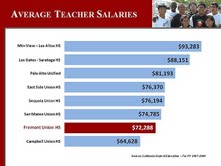
According to Faculty Advisory Committee member and social science teacher Bonnie Belshe, the other half of the stimulus money granted to current teachers is different from an ongoing raise in that it is “one-time money”. The stimulus money was from a 2010 Federal Jobs Bill passed by Obama, granting the FUHSD almost three million dollars and allowing about $900 to be added to teachers’ salaries for this year.
“We could have paid that money out to teachers last year,” Stark said. “If we did that though, [during] the next year when we have much less budget available, teachers would have to be laid off.”
According to Belshe, because FUHSD is located in an area with high property values, and is thus characterized as a “basic-aid” district. FUHSD must collect funding through local property taxes instead of receiving a certain amount paid per pupil by the state as other districts are. However, due to the economic downturn in 2008, Cupertino homes have not been selling for prices as high as in past years. FUHSD’s income from property taxes has consequently reduced, forcing it to make do with less funds than before.
The district student enrollment, according to the FUHSD website, is expected to grow by 1,000 by 2017. But regardless of the growth in student population, no additional state funds are granted to accommodate for the additional students. For this reason the district feels that, according to its website, “it is part of [its] fiscal responsibility to be diligent about residency verification” to save the one to two million dollars by doing so.
On top of these limited funds, the district must contribute its “fair share” amount, which is millions of dollars which the state normally offers to fund special programs that it is now asking for back to allocate to other underfunded districts. FUHSD must return approximately 8.9 percent of the state education budget, which is several millions of dollars from funding.
“The school district budget is roughly one hundred million dollars [per year]. If you have five or six million dollars pulled out of that in the middle of the year, it’s pretty nasty,” Stark said. “And if they tell you they’re going to do that for the next couple of years too [and] it sounds permanent, that’s a big problem because we don’t have lots of money lying around.”
These several millions of dollars to be paid back to the state, according to Stark, will be removed from the “general fund,” which mainly covers salaries for teachers, administrators and other staff members. Teacher salaries often absorb two-thirds of any cuts made from the general fund.
“There’s no way to get money back other than to eliminate employees and eliminating their salaries,” Stark said.
Stark believes that though the FUHSD budget planning is adequate, it is suffering the consequences of poor budget planning on behalf of the California education system.
“The state is in terrible shape in terms of how much they spend and how much tax money they’re getting, so they’re looking for every possible place they can to squeeze some money out,” Stark said.
The number of teachers’ jobs that would be saved through this combination of one-time stimulus money and short-term savings, according to Stark, would be enough to save approximately six or seven jobs, across the district, producing a temporary improvement.
FUHSD faced such monetary troubles most recently during 2004, but, according to Stark, its condition then was not as serious as it currently is. Since the 2004 incident the district and school staffing has become more efficient to reduce the need for more positions. FUHSD has also become more serious about trimming expenses while still maintaining its objective to provide students with a well-rounded education.
“The district is working very, very hard to try to keep programs intact. They’ve committed themselves to do whatever accounting manipulations [are] possible and practical, and use whatever one-time sources of money there are,” Stark said. “Their hope is that they can get us through a short term crisis. If the economy improves over the next year, we’ll probably be okay. If the economy recovery is very slow, we might have trouble in future years.”








